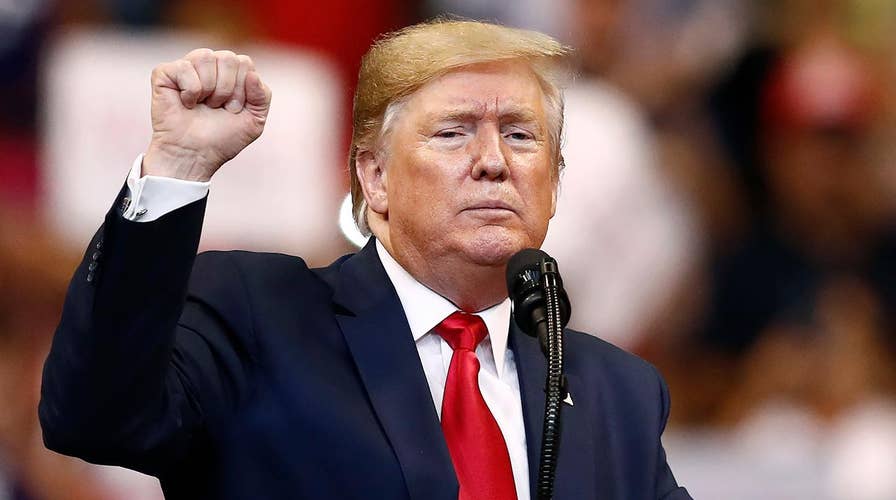President Trump wants to designate Mexican drug cartels as foreign terrorist organizations
Groups designated foreign terrorists face intense scrutiny from U.S. government agencies and increased sanctions; Gillian Turner reports from Washington.
President Trump has said efforts to designate Mexican cartels as foreign terrorist organizations (FTOs) are moving ahead – prompting both praise and criticism. But what impact would such a title have, and would it work in dismantling such networks who burn, behead, smuggle and instill fear?
“The Mexican Cartels certainly earned a designation of a Foreign Terrorist Organization which is authorized in the Immigration and Naturalization act. Under the ‘terrorist activity defined, they meet the criteria for being engaged in hijacking and sabotage conveyances, detaining/murder/ injuring an individual or a government organization to keep them from doing any act as a condition for the release of an individual,” Lenny DePaul, Chief Inspector/Commander of the U. S. Marshal Service, told Fox News. “As well as assassinations and use of explosives, firearms, or other weapons with the intent to endanger individuals, government agencies or damage to property, etc.”
In his view, “the impact that a designation would have is significant in a variety of ways. It heightens public awareness and knowledge of individuals or entities linked to terrorism.”
“It also sends a message to other Governments about the concerns the U. S. has about individuals or entities aiding terrorism, and promotes due diligence by such governments and private sector entities operating within their territories to avoid potential contact with terrorist,” DePaul continued.
WHERE DOES MEXICO REALLY GET ITS GUNS?
Terrorist designations are handled by the U.S. State Department. Once a group has been slapped with such a designation, known members are prohibited from entering the country, and it is then illegal for those in the U.S. to intentionally provide support. Financial institutions are also barred from doing any type of business with the organization or its members.
“The FTO designation is an important step in a positive direction for US national security. Too many Americans have died as the ruthless cartels have made billions by terrorizing communities and killing at unprecedented levels. It's clear President Trump always places the safety of Americans first,” noted Derek Maltz, former Special Agent in Charge of the Drug Enforcement Administration Special Operations Division in New York. “Designating the cartels as terrorists and implementing a focused operational plan will save a tremendous amount of lives.”
The FTO tag could also mean that an American in an inner-city gang selling street drugs that originated from south of the border could be prosecuted under anti-terrorism laws – possibly being given a life sentence.
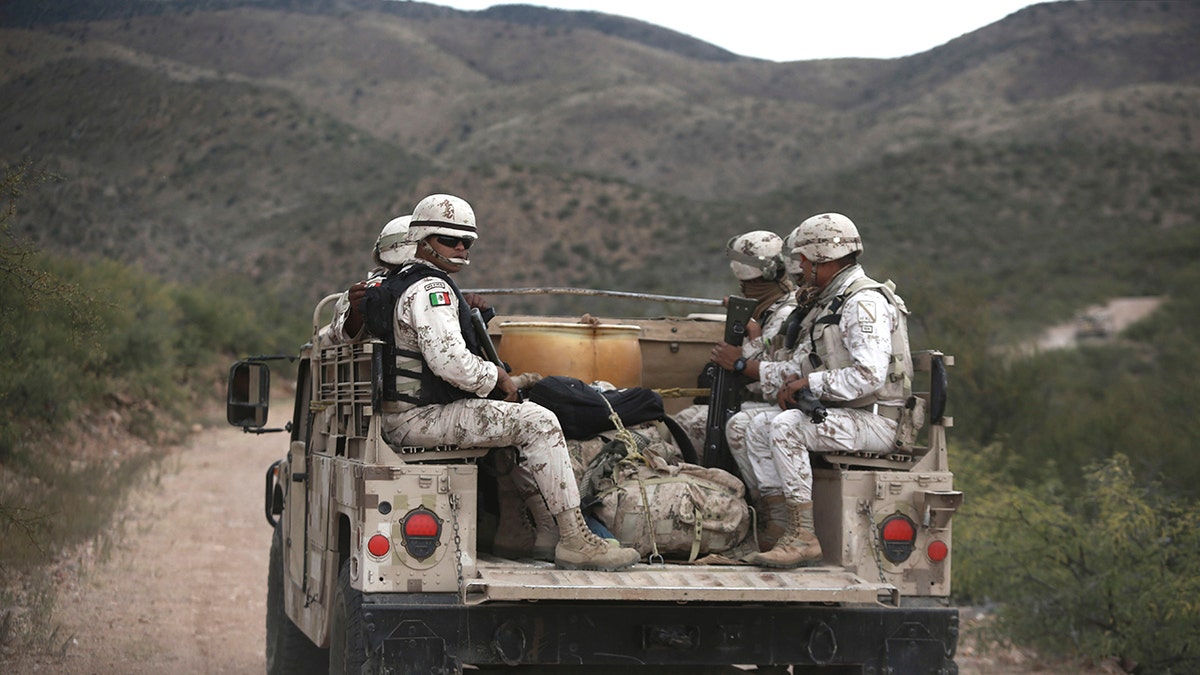
Mexican national guardsmen patrol near Bavispe, at the Sonora-Chihuahua border, Mexico, Wednesday, Nov. 6, 2019. When drug cartel gunmen opened fire on American women and children in northern Mexico on Monday, the Mexican Army, the National Guard and Sonora state police were not there to protect them. It took them about eight hours just to arrive. (AP)
It remains to be seen precisely which cartels will receive the FTO label, as there are dozens of cartels known to be operating across Mexico. The Drug Enforcement Administration (DEA) lists seven as the most prominent - the Gulf Cartel, Jalisco New Generation, Beltran Leyva, Juarez, Los Zetas, Sinaloa, and Tijuana/Arellano Felix.
“The statute requires groups to be designated individually,” said Amb. David Johnson, Vice President of the International Narcotics Control Board and former Assistant Secretary of State for International Narcotics and Law Enforcement Affairs. “So while the Administration could designate several and attempt to capture all of them, designations will take place one at a time and will leave some out, creating winners and losers in an industry where those kinds of issues are settled with violence that kills lots of innocent bystanders.”
It is likely, according to U.S. officials, that the initial focus would be on the Sinaloa cartel, previously headed by Joaquin “El Chapo” Guzman and the equally as brutal Jalisco New Generation Cartel, run by Nemesio “El Mencho” Oseguera Cervantes.
“They are the largest, most ruthless and dominant, and their lethal products are killing U.S. citizens on a daily basis,” Maltz said. “The FTO designation is long overdue.”
The FTO classification of cartels has long been floated in Washington circles but has gained little traction in the past given concerns that over the impact on bilateral relations between the neighboring nations.
MEXICAN PIRATES POSING GREATER RISK IN GULF OF MEXICO TO OIL WORKERS, TOURISTS
As it currently stands, Mexican drug cartels are classified as drug trafficking organizations (DTOs) despite being involved in a broader assortment of criminal activity far beyond the realm of the illegal drug trade – ranging from fraud, gun trafficking, bribery, money laundering and counterfeit smuggling to human trafficking and extortion.
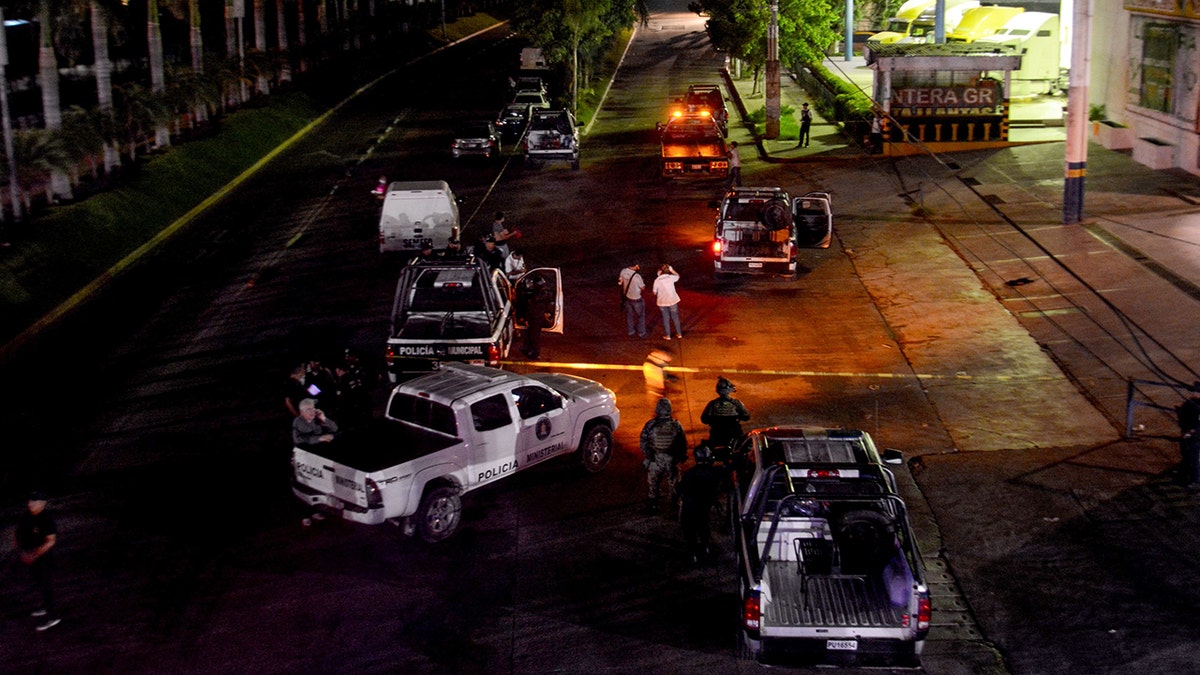
Policemen work at a crime scene after a colleague was killed in Acapulco on July 23, 2018. - Mexican President-elect Andres Manuel Lopez Obrador, who will take office on December 1, 2018 inherits a messy war on drug cartels from his predecessor Enrique Pena Nieto. Since Mexico deployed its army to fight drug trafficking in 2006 during the presidency of Felipe Calderon, the country has been engulfed in a wave of violence that has left more than 200,000 murders, 30,000 missing, as well as complaints against the heavily armed security forces for violations, extrajudicial executions and forced disappearances. (AFP/Getty)
A number of the groups also have the additional label of Transnational Criminal Organizations (TCOs), but authorities have bemoaned that the two labels still don’t give U.S. law enforcement or military enough bandwidth to effectively tackle the problem the way they would an official FTO like ISIS, Hezbollah or Al Qaeda.
However, there is already a law on the books – the Foreign Narcotics Kingpin Designation Act – which has been in place for two decades and gives the U.S. Treasury Department the leverage to freeze any assets of the cartels found within the U.S, and to prosecute any Americans who aide their endeavor financially or handle their money.
“The kingpin designation is a very powerful tool in the U.S arsenal to address complex threats to the country. However, based on the current status and the growing problem from the terror cartels, the USA needs to use all the authorities and resources of the best country in the world to stop this madness,” Maltz contended. “Death is escalating, and it is time the cartels feel the full force of America.”
Brian Kolfage, the U.S. Air Force veteran behind the controversial “Build the Wall” GoFundMe effort, which is building barriers in Texas and New Mexico, also advocated his support of the FTO marking.
“The cartels are the underlying issue to every single border-related problem we face,” he said. “We have to wipe out the underlying condition in order to fully solve the problem. Naming each cartel as a foreign terrorist organization is the first step in the right direction.”
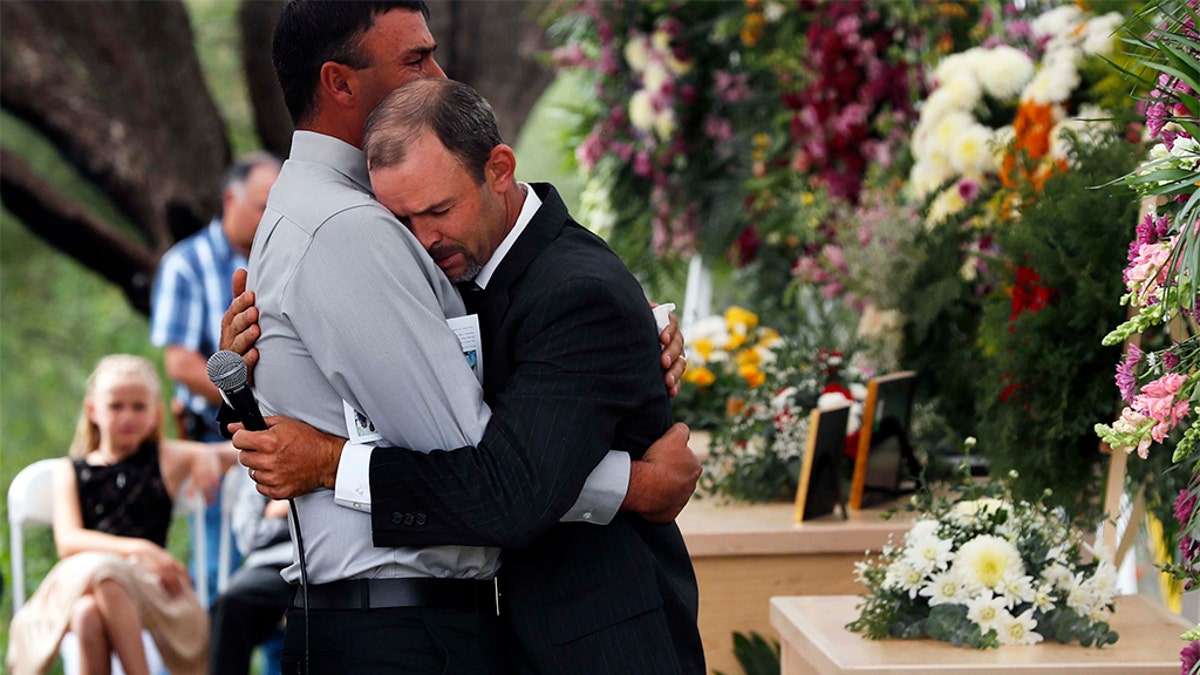
Men embrace next to the coffins of Dawna Ray Langford, 43, and her sons Trevor, 11, and Rogan, 2, who were killed by drug cartel gunmen, during the funeral at a family cemetery in La Mora, Sonora state, Mexico, Thursday, Nov. 7, 2019. Three women and six of their children, all members of the extended LeBaron family, died when they were gunned down in an attack while traveling along Mexico's Chihuahua and Sonora state border on Monday. (AP)
But according to Johnson, the motivations of FTOs such as ISIS differ significantly from those of the Mexican cartels, which could bring about some backlash in the approval process.
“Terrorists use violence to expand a political goal. These criminals are interested in money, not politics. They don’t want the responsibility and headaches that come with political control since it could interfere with their profit-maximizing goals,” he explained. “The key reason for not labeling them terrorists is because that is not what they are. They are in it for the money. Period.”
The move could still bring about sweeping changes in terms of how bilateral relations are managed between the U.S. and Mexico, which share a 2000-mile border, and have a detrimental dent on the trade affiliation, critics warn.
“The law of unintended consequences could run amuck since there is no experience with such a designation,” Johnson pointed out. “And even if legal consequences don’t immediately arise, the fear of the unknown could significantly impact the economic relationship.”
Yet, Trump has remained firm in his stance.
“They will be designated. I’ve been working on that for the last 90 days,” Trump told Bill O’Reilly in an interview earlier this week. “Designation is not that easy. You have to go through a process, and we are well into that process.”
The President’s pledge comes amid heightened tensions with the Mexican government and at a time when cartel violence has grimly hit the headlines.
In early November, nine U.S. citizens – three mothers and six of their children belonging to a Mormon community – were shot dead in the northern state of Sonora in an attack believed to have been fueled by RIVAL drug cartels.
The ambush came just a couple of weeks after Mexican security forces made the humiliating decision to retreat – and subsequently release one of the sons of the infamous drug lord Joaquin “El Chapo” Guzman – after his detainment, sparking questions of incompetence or compliance with cartels.
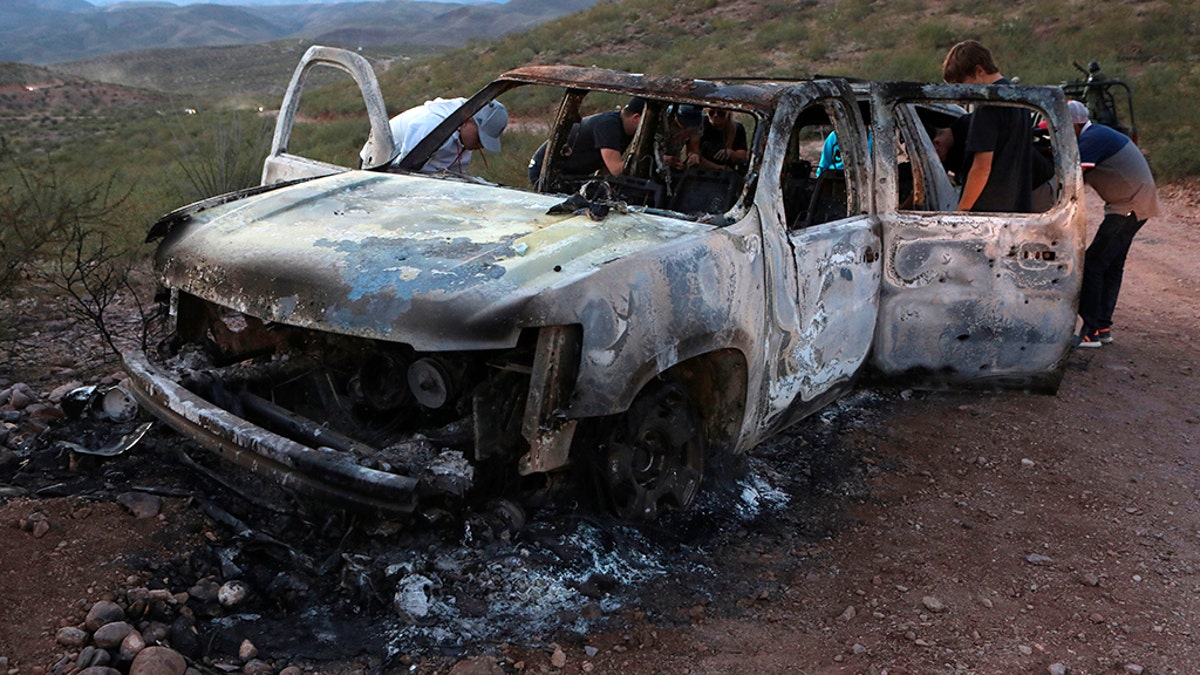
Members of the Lebaron family watch the burned car where part of the nine murdered members of the family were killed and burned during an gunmen ambush on Bavispe, Sonora mountains, Mexico, on November 5, 2019. - US President Donald Trump offered Tuesday to help Mexico "wage war" on its cartels after three women and six children from an American Mormon community were murdered in an area notorious for drug traffickers. (AFP via Getty)
In August, Mexican police discovered 19 bodies in Mexico City, with some nine of them hanging from an overpass next to a drug cartel banner as a threat to competing factions.
According to the latest annual assessment from the DEA, Mexican DTOs pose the greatest crime threat to the U.S. and are continuing to “expand their control of the opioids market” in conjunction with the deadly spike in overdoses in recent years. However, officials have also lamented that “the scope of violence generated by Mexican crime groups has been difficult to measure due to restricted reporting by the government and attempts by groups to mislead the public.”
Moreover, Mexico’s homicide rate – routinely driven by cartel-connected violence – is on the path to reaching unprecedented levels this year, even higher than the record numbers set in 2018 in which more than 30,000 people were slain.
The notion has also been raised that an FTO designation could strengthen some asylum cases, complicating the Trump administration’s endeavor to cut back on those being admitted to the U.S. under such a convention.
Mexican officials have primarily condemned the classification, expressing concern that it could comprise the country’s jurisdiction.
“Our problems will be solved by Mexicans,” President Andres Manuel Lopez said a press conference on Monday. “We don’t want any interference from any foreign country.”
Mexican Foreign Minister Marcelo Ebrard doubled-down that “Mexico will never admit any action that would be a violation of its national sovereignty.”
“We will act firmly. I have transmitted our position to the U.S., as well as our resolve to face international organized crime,” he tweeted.
However, the Mexican president and his administration are known to pursue policies that involve military action against the cartel networks but have instead vowed to tackle the problem by addressing the “root causes” such as corruption and poverty.
Yet others are skeptical that the change in designation will make much of dent in the burgeoning cartel problem.
“It will have little to no impact on their operations. The main reason is their support system is vast and reaches into the highest levels of the Mexican government that they would be able to withstand a long protracted fight against the U.S. military,” added Gabriel Ruiz, a California border-based deportation officer with the U.S. Immigration and Customs Enforcement (ICE). “The government would never allow our military to operate within the country, even if it's to fight the cartels. The government is still reeling from the embarrassments of not successfully serving justice on El Chapo and, recently, letting go his son and running away from the fight the cartels brought.”







































